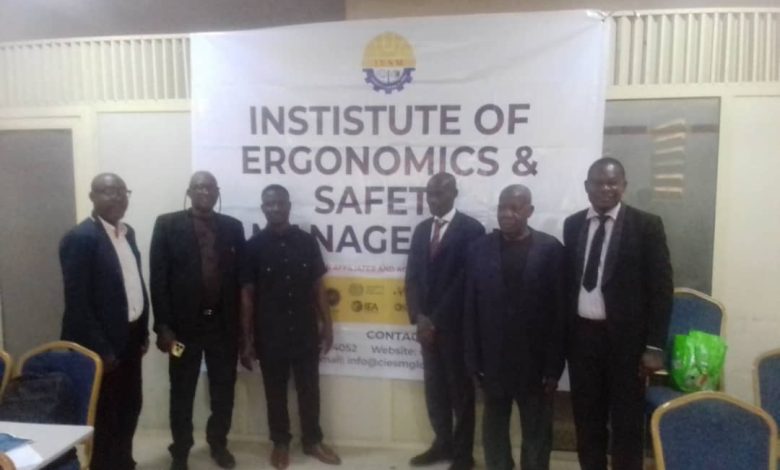Help Yourself Retire In Good Health, Prof Gbolabo Tasks Workers

Workers in the country have been told to make concerted effort to retire well and in good health too, by adopting health friendly postures in the course of carrying out their daily chores.
Professor Ajao Adewale Gbolabo of the Nigeria Army College of Nursing (NACON) made the call while delivering a lecture at the induction of members of Institute of Ergonomics And Safety Management (IESM) recently in Lagos.
In a paper titled “The Value of Ergonomics Professionals: Building safer, smarter and Healthier Workplaces”, he noted that most workers have been forced to retire in poor health thereby making their retirement a thing of pain as against thing of joy after long years of service.
He blamed the sad story on lack of exercise, sitting for long hours on poorly constructed workplace chairs and desks, poor eating habit to mention just a few.
Defining Ergonomics as the study of people in their working environment, Prof Gbolabo who is a fellow of Chartered Institute of Sustainable Development and Management Science, noted that regular complaints among retirees and even some workers still in employment about low back pain, cardiovascular diseases, Arthritis, obesity etc have been linked to poor postures and poor working tools a the work places.
As panacea to the ugly trend Prof Gbolabo advised workers to “Always rest their backs while working on their desks, flex their knee before lifting heavy objects, cut down on soft drinks, and alcohol while increasing fruits and vegetable intakes”
His charge was however not limited to workers alone, as employers of labour were also advised to take into consideration height and weight of workers before assigning them to certain jobs.
“It is important to measure the weight and height of a worker before assigning jobs to them, unfortunately in Nigeria today, that is not done you simply employ people and say you go there and your that way, that is very wrong, you must look at their body structure before assigning them to departments” he said
The general public was also not left out, as all and sundry were encouraged to know their Body Mass Index (BMI) that is the relationship between their weight and height so as to reduce cases of obesity and other preventable diseases. “Everyone needs to know their weight and height and also their Body Mass Index.
For a man the BMI should be 15%, at 20% you are overweight and at 25% you are obese. A woman should have BMI of 20%, at 25% you are overweight and at 30% you are obese” he revealed.
In what may appear to some people especially those who opine that it is a taboo for men to cry in Africa, Prof Gbolabo advised that people should be allowed to cry if need be, to let our emotions rather than bottle it up with its attendant side effect.
“Be a positive thinker, it is good for your mental health, learn to smile and laugh, shed tears of joy and sorrow if you have to do so. If you see anybody that is bereaved let them cry. Don’t tell them not to cry. Let them cry it out. Pepped up emotions is detrimental to both mind and health” he submitted.
According to International Labour Organisation (ILO), nearly three million workers die every year due to work-related accidents and diseases, an increase of more than 5 per cent compared to 2015, according to new ILO estimates. The toll underscores the persistent challenges in safeguarding the health and safety of workers, globally.
Most of these work-related fatalities, totalling 2.6 million deaths, stem from work-related diseases. Work accidents account for an additional 330,000 deaths, according to the analysis. Circulatory diseases, malignant neoplasms and respiratory diseases rank among the top three causes of work-related death. Together, these three categories contribute more than three-quarters of total work-related mortality.





